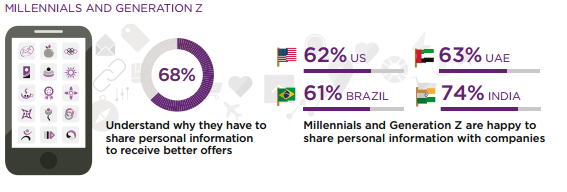 Although most consumers are willing to share their personal information with companies, brands are generally not taking advantage of that opportunity, a new survey reveals.
Although most consumers are willing to share their personal information with companies, brands are generally not taking advantage of that opportunity, a new survey reveals.
Eight in 10 consumers around the world are willing to share key pieces of personal information such as names and email with brands, and seven in 10 are willing to share their birth dates, hobbies and occupations, according to a survey by Aimia, a marketing and analytics firm.
More than half (55%) of consumers surveyed say they will share their personal information to get better offers and rewards, but only 8% feel they receiving those benefits. In addition, less than a quarter (23%) of consumers say the communications they receive from businesses are highly relevant to them. The survey of over 20,000 consumers in 11 countries shows that businesses are not using customer data to personalize and tailor customer experiences effectively.
Data Exchange: A Golden Moment Missed
“This is a golden moment for companies to build meaningful relationships with their customers, but this opportunity will quickly disappear if companies fail to respond appropriately,” said David Johnston, group chief operating officer at Aimia. “Companies need to realize that the power in the data exchange economy rests with the customer. To be successful, companies must think about what they can do for the customer, not to the customer, with each personalized communication, experience and offer.”
Consumers are more willing to share names and email addresses (82%) and nationality (81%) and least willing to share information about online purchases (44%), incomes (43%) and web history (28%).
The study shows that marketers have the greatest opportunities with Generation Z, those born in the late 1990s and 2000s, millennial consumers, and in what Aimia calls “disruptor” nations, developing countries like Brazil and India. These groups are much more inclined to share their data with brands, including mobile numbers, lifestyle information, email addresses and other critical pieces of information.
Millennial and Generation Z consumers are more willing to share their mobile phone number than other generations. In the U.S., 51% of 18-24 year olds are willing to share their mobile phone numbers, compared to 30% of Baby Boomers. The average across all age groups in the U.S. to share mobile phone numbers is 43%.
It Depends on the Benefit
Previous research by PricewaterhouseCoopers reached similar conclusions. Most consumers surveyed (73%) will share personal information in return for a benefit. Willingness to share information depends largely on the benefit. One responded: “Do I want a free candy bar? No? You don’t get my information. A free timeshare? Okay, what do you want to know about me?”
The study reports that:
80% of survey respondents were willing to share information if the company informs them upfront about how it will be used.
87% want to be able to manage what information is used and how it is used.
78% of consumers ages 18 to 29 are willing to share personal information, compared to 68% of those 45 to 59.
Focus group participants said they have higher trust levels for large businesses, including utilities and financial institutions.
“For businesses, this willingness to share information represents rich opportunities to reach and connect with consumers in new and exciting ways,” the report concludes. It recommends marketers educate consumers about the benefits of sharing their information, be transparent about their practices, and market to younger demographics.
Bottom Line: Brands may be missing a substantial opportunity in developing meaningful relationships with their customers. Consumers are willing to provide their personal information in return for rewards and discounts, but many brands are not living up to their end of the bargain.
William J. Comcowich founded and served as CEO of CyberAlert LLC, the predecessor of Glean.info. He is currently serving as Interim CEO and member of the Board of Directors. Glean.info provides customized media monitoring, media measurement and analytics solutions across all types of traditional and social media.






Oh, right! I believe that companies should move and take advantage of this time. They should be building a relationship with consumers. It will create an attachment of trust. And in my on analysis, this time will be very helpful in strengthening long-term trust that will bring security on brand’s future days. The economy and consumers are evolving. With that foundation, it will easily sway those that patronize your brand.